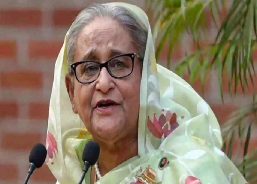After Dhaka has sent a formal request to India requesting it to extradite ousted Prime Minister Sheikh Hasina, the moot question that has propped up is: will New Delhi come under pressure and send its old-time ally back to her country?
Hasina quit her office and fled to India on August 5, 2024, as thousands of the people took to the streets protesting against her and stormed her official residence, vandalised it and looted almost everything they could take away.
She said later that there was a conspiracy to kill her and her sister Sheikh Rehana in the same way as her father Sheikh Mujibur Rehmand and many other members of the family including 10-year-old brother Russel, were killed in a coup on August 15, 1975.
Dhaka Wants Sheikh Hasina To Face Trial
Confirming the extradition request, Foreign Affairs advisor to the interim Bangladesh government, Muhammad Touhid Hossain told journalists Monday that a note verbale had been sent to India. He clarified that the government wants the former Prime Minister back in the country to stand trial and face justice.
Earlier, a tribunal issued arrest warrants against the ousted prime minister and 45 others, including Hasina’s close aides and top Awami League leaders. They have been accused of committing crimes against humanity.
Chief Prosecutor Muhammad Tajul Islam said earlier that the tribunal’s Chairman Muhammad Golam Mortuza Majumdar had issued the orders after the prosecution filed two petitions seeking the arrest warrants.
Sheikh Hasina Accused Of Genocide
The Muhammad Yunus-led interim government has filed about 200 cases against Sheikh Hasina, related to murders occurring during the student protests.
Media reports claim, that more than 230 people were killed in the student protests demanding the withdrawal of reservations for descendants of those who participated in the Bangladesh Liberation War in 1971. Hasina, other politicians and top officials have been held responsible for these deaths.
Why India May Not Extradite Sheikh Hasina
Analysts believe India may not extradite the former Prime Minister to Bangladesh notwithstanding the extradition treaty signed with Dhaka. Ironically, the agreement was signed when Sheikh Hasina was the Prime Minister of the country.
According to a clause in the India-Bangladesh Extradition Treaty signed in 2013, New Delhi can reject the request if the charges are politically motivated.
The extradition treaty also has a long list of crimes that would not be deemed politically motivated. It includes murder, kidnapping, bomb explosion, and terrorism.
Political observers believe that, as Sheikh Hasina has been accused of murder and genocide, it would be difficult for India not to deport her on this basis.
However, according to Clause 10 (3), inserted into the treaty in 2016, giving proof of crime will not be mandatory, an arrest warrant issued from a court of law will be sufficient for the extradition.
Considering this, if even a district court issues an arrest warrant against Sheikh Hasina and Dhaka asks for her extradition, India will be in a very difficult position.
In this case, a tribunal has issued an arrest warrant against the former Bangladesh Prime Minister.
Analysts believe India can reject the extradition request under certain other provisions of the treaty. The request can be turned down if a case that requires extradition to the country to which the extradition request has been made is filed in that country.
However, no case has been filed against the Bangladeshi leader, nor there is any possibility of doing so shortly.
Will India Deny To Send Hasina Back?
Political analysts believe New Delhi can deny the extradition request if the charges are made not in the interest of the judicial process.
Experts point out that New Delhi can also reject extradition requests if the charges are related to social crimes and do not come under criminal jurisprudence.
India can also reject the extradition request because Sheikh Hasina can be treated badly or denied justice.
Foreign Secretary Visits Dhaka
India can cite the example of former Education Minister Deepu Moni, who was assaulted in the court premises. It can also be pointed out that Industrial Advisor Salman F Rehman was humiliated while being produced in the court.
After Indian Foreign Secretary Vikram Misri visited Dhaka and met the chief advisor recently, it was thought that the bilateral ties would improve.
Though Bangladesh officials and the Nobel laureate complained about Hasina’s statements being made from India, they did not drop any hint on her extradition.
It was believed that as the two countries held talks and emphasised working together and India indicated to work closely with the present dispensation of Bangladesh, Dhaka would not do anything that night to create problems for New Delhi.
However, New Delhi may be shocked and caught napping in this respect.
Experts believe Dhaka may have taken this step in an attempt to put pressure on India and warn Sheikh Hasina that she must stop criticising the present dispensation led by Muhammad Yunus after she accused him of committing genocide and being involved in corruption when he was the head of microfinance company Grameen Bank.



